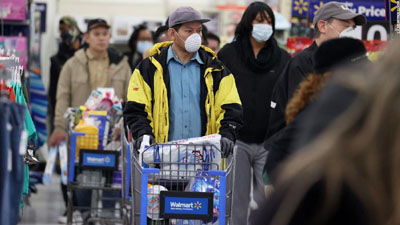Wednesday January 27, 2021 | NATIONAL
by Mary P Brooke, editor | Island Social Trends (south Vancouver Island, BC)
“Small businesses have really suffered in this pandemic,” says NDP Leader Jagmeet Singh. He says that’s what the federal NDP have been hearing from businesses over the past year.
“Big box businesses been able to survive and many of them thrive and they’ve actually seen massive profits,” says Singh. He notes that meanwhile, Liberal government policies have “favoured larger corportations, and have hurt small business”.
Getting the commercial rent support right:
“We have not seen enough help for small businesses. Particularly, when we talk about supports for commercial rent – one of the major concerns raised,” he said in response to a question from Island Social Trends about the well-being of small businesses during the pandemic.

“The Liberals failed the initial (commercial rent) program which was designed for the landlord not tenant. The small business had to hope that the landlord would apply for it, and that was clearly flawed from the beginning. And so we fought to get some changes, and now it’s been retooled so the tenant, the small business, can apply for the help,” the Singh said.
Continuing support for self-employed:
Among other things, there has been a fairly rocky ride of transition between the easily-applied-for Canada Emergency Response Benefit (CERB) and the Canada Recovery Benefit (CRB) that was stylized to help address the income shortfall needs of self-employed business owners.
The transition took place in the fall of 2020 in such a way that small businesses really had to be paying attention to avail themselves of the CRB program, while at the same time possibly dealing with a clawback of CERB payments if there had been confusion between net income and gross income as part of their calculation to qualify for the support.
The CRB deducts tax at source (i.e. before paying the benefit), whereas CERB was paid out in full (later with an emphasis that it was taxable income).
Self-employed people are generally not eligible for Employment Insurance (EI), so it was, in fact, a good level of recognition that a distinct program (ending up as CRB) was required for small entrepreneurial and home-based business operators.
Biggest not paying their fair share:
“The biggest, wealthiest, biggest corporations, have not only gotten by but many have been making massive profits. They’ve not been paying their fair share, and they should,” Singh said in observing the business landscape during the pandemic.

“Small businesses have struggled. They need help and we need to make sure we’re supporting them,” said Singh. He adds that a lot of people are worried that the local shops in their communities are going to shut down and never open up again. “That would be devastating for jobs, for the local community, for the vibrancy of communities and neighbourhoods. So we need to take a serious look at how we can support small business.”
Need a flexible range of supports:
The NDP intends to continue addressing the needs of small business during the pandemic by taking an interest in the range of mechanisms for supporting small business recovery in 2021. That could be through commercial rent support, direct financial support or interest free loans — three things Singh quickly listed today during a press conference from Ottawa.
“We need to be very flexible about the type of help that we provide so that small businesses can receive them. We need to listen to what they need in terms of support and acknowledge they have been hard hit. When lockdowns have happened, large massive scale big box shops have been able to stay open and smaller businesses have been forced to shut down. That has meant that they have felt this impact disproportionately,” said Singh.
“Small business has been harder hit, so we need to flexible and open to how we help small businesses, recognizing their value in local communities.”





